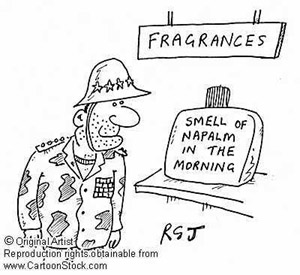
Oddly enough, the use of the napalm-like MK-77 firebomb was reported in the San Diego Union-Tribune on August 5, 2003. (I read the article on Global Security.org.) The article explains
Yesterday's article in The Independent states that the U.S. confirmed to Adam Ingram, Britain's Defense Minister, in January 2005 that MK-77s had not been used. Did the American military officials not know about the Union-Tribune article in 2003? Were they betting that no one would remember it?During the war, Pentagon spokesmen disputed reports that napalm was being used, saying the Pentagon's stockpile had been destroyed two years ago.
Apparently the spokesmen were drawing a distinction between the terms "firebomb" and "napalm." If reporters had asked about firebombs, officials said yesterday they would have confirmed their use.
More did-I-need-to-know-that: Todd writes on Freiheit und Wissen that "such incendiaries [depleted uranium, white phosphorus ammunitions, and napalm] have been prohibited by the 1980 Protocol III of the Geneva Convention—a protocol which the U.S. has refused to ratify to this day, despite general international agreement."
I recalled the line "I love the smell of napalm in the morning" from the Coppola film Apocalypse Now and did a search for "napalm smells like." Aside from the numerous results stating that napalm smells like "victory," one person in an online forum said it smelled "fruity" and another in a blog comment wrote that it "smells like vanilla-caramel scented gasoline."
The Union-Tribune article quoted Col. James Alles, who commanded Marine Air Group 11 during the war, as saying "The generals love napalm. It has a big psychological effect." Was he just ironically referencing the movie? Or do they—

2 comments:
John,
Freiheit und Wissen's Charles Norman Todd (whose blog post I linked to) defines WMD: "D.U., white phosphorus, and the new generation of napalm all constitute weapons of mass destruction – weapons whose effects cannot be made precise, whose impact covers a wide area, and in the case of D.U., will remain for generations after the conflict is over."
Wikipedia's definition: "Weapons of mass destruction (WMD) generally include nuclear, biological, chemical and, increasingly, radiological weapons." (http://en.wikipedia.org/wiki/Wmd)
Don well said
Post a Comment